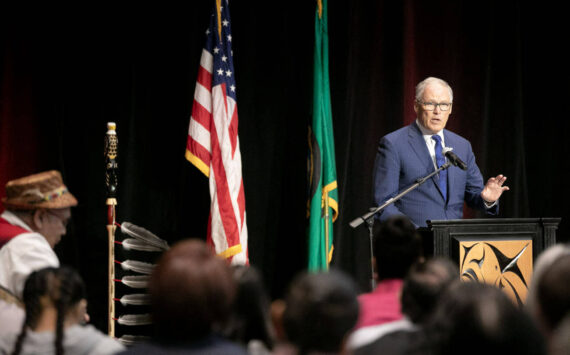Tacoma City Council is expected to vote in October on whether to modify a nearly-60-year-old ordinance that has governed how City Hall collects revenue through its Business and Occupation (B&O) tax. The issue received much discussion Tuesday during council’s noon study session.
“This supports small businesses and is a long-term strategy to make Tacoma a desirable place to do business,” said Tacoma Mayor Marilyn Strickland, who presented a plan to change the tax policy.
According to the city’s tax and license division, if you are a business owner who earns $75,000 or more in gross revenue this year, you are required to pay the tax (last year, the figure was $72,500). Under Mayor Strickland’s plan, that so-called “threshold” could be raised to impact only business owners who earn more than $250,000 in gross revenue. If Council changes the ordinance, approximately 4,900 business owners who fall below that threshold would essentially receive a break on their B&O tax bill.
It might be great news for small business owners specifically, but it would leave the city looking for how to make up for what is projected to be approximately $1.4 million in lost revenue next year as a result of the change.
Still, Mayor Strickland sees its importance.
“It sends a positive message about Tacoma’s business climate and encourages entrepreneurs in Tacoma,” she said Tuesday. She added that the city could see some revenue gains if small businesses decide to open in Tacoma because of the B&O tax change. And for businesses that were once below the $250,000 threshold but go on to exceed it, the mayor would like to see them eased back into the system: businesses earning $251,000 to $259,000 would pay 10 per cent of the B&O tax due; $260,000 to $269,000 would pay 20 per cent; $270,000 to $279,000 would pay 30 per cent; $280,000 to $289,000 would pay 55 per cent; $290,000 to $299,000 would pay 75 per cent; and businesses earning $300,000 or more would pay 100 per cent.
She also noted that setting Tacoma’s B&O tax threshold at $250,000 would make it more competitive than thresholds in Everett ($20,000), Olympia ($20,000), Bellingham ($20,000), Bremerton ($60,000), Seattle ($80,000), and Bellevue ($125,000).
For year, many people in the business community have complained Tacoma has been dogged by the B&O tax. Nearby cities such as Fircrest, Lakewood, and Fife, which don’t have B&O tax ordinances, have benefited from Tacoma’s extra fee on business owners. Why locate your business in Tacoma and pay the B&O tax when you can duck the fee by locating a mile or two outside the city limits?
During an interview with the Tacoma Daily Index earlier this month, Councilmember Marty Campbell said he supported the tax change. He was aware of some businesses that have located outside Tacoma because of the B&O tax. He pointed to a large construction firm that he claims recently re-located to Fife for that very reason. Their B&O tax was typically $400,000 per year, according to Campbell. “That’s a pretty big number,” he said. “I can see why they would make a decision to re-locate outside Tacoma when they can save $400,000 a year. To a large construction company, being located off one I-5 exit versus another exit doesn’t make a difference.”
Another factor for the construction company, said Campbell, is passing along the B&O tax to its customers. “When that construction company figures a bid, they figure the B&O tax right into the bid,” he explained. “If they weren’t paying a B&O tax, what you would see is the bid would be slightly lower, which would make them a little more competitive. We want our businesses to be competitive.”
The construction company isn’t a perfect example; after all, it makes more than $250,000 in gross sales and therefore would still pay B&O taxes even if the city raised its threshold. But it does illustrate how any business, large or small, weighs its decision to set up shop in Tacoma in light of the tax.
On a more personal level, Campbell said he was well aware of the tax long before he was elected to City Council last year. As the long-time owner of two Tacoma businesses — Buzzard’s Discs and Stadium Video — Campbell, like every business owner in Tacoma, was required by the City of Tacoma and the State of Washington to report his quarterly earnings and pay his share of the B&O tax. Last year, according to Campbell, he wrote checks totaling $1,200 to cover B&O taxes for both businesses. It wasn’t his biggest business expense, but “particularly for small businesses, little amounts like that matter,” he said. “That’s $1,200 I could have put into more product, a few more hours for employees, or a little more advertising.”
During the meeting Tuesday, Strickland said of the total B&O tax paid by Tacoma businesses, approximately 20 per cent goes to the city, and approximately 80 per cent goes to the state. She provided several examples showing city and state B&O tax burdens:
— A retail business with gross revenues of $75,000 pays no B&O tax to the City of Tacoma, but pays $353 to the State of Washington;
— A retail business with gross revenues of $100,000 pays $153 to the City of Tacoma, and $471 to the State of Washington;
— A service business with gross revenues of $75,000 pays no B&O tax to the City of Tacoma, but pays $1,350 to the State of Washington;
— A service business with gross revenues of $100,000 pays $400 to the City of Tacoma, and $1,800 to the State of Washington;
— A retail business with gross revenues of $250,000 pays $484 to the City of Tacoma, and $1,178 to the State of Washington;
— A service business with gross revenues of $250,000 pays $1,000 to the City of Tacoma, and $4,500 to the State of Washington.
(NOTE: Mike Gowrylow, Communications Director for the Washington State Department of Revenue, contacted the Tacoma Daily Index to dispute Mayor Strickland’s data. He notes the state provides B&O tax credits of $35 per month for all businesses except those in the service industry, which receive credits of $70 per month. Therefore, Gowrylow argues a retail business with gross annual revenues of $75,000 pays no B&O tax to the State of Washington due to the small business credit; a retail business with gross annual revenues of $100,000 pays $101 to the State of Washington after receiving a small business credit of $370; and a service business with gross annual revenues of $75,000 would owe $1,105 to the State of Washington after receiving a small business credit of $335).
So why not just abolish the city’s B&O tax?
It’s not so easy.
According to the city’s tax and license division, revenue collected from the B&O tax comprises almost 20 per cent of the city’s general fund budget. The city collected approximately $42 million in revenue through B&O taxes in 2007; approximately $44 million in 2008; and approximately $40 million in 2009. The money is used to pay for a variety of services such as street repairs, libraries, and emergency services such as police departments and fire departments.
“I would love to say ‘bye-bye’ to the B&O tax, but that would be irresponsible,” said Campbell during the Index interview. “It would be like saying we’re not going to take property tax anymore. Home owners would say, ‘Woo-hoo! Great!’ But don’t bother to call the police. And if you have a fire, buy bigger garden hoses. Ultimately, our bottom-line is we need to ensure we have the same level of service.” (note: Campbell says his two businesses already earn more than $250,000 in gross revenue, so raising the threshold would not exempt him from paying B&O taxes).
Raising the threshold is an idea that has received much attention this year from City Council’s Government Performance and Finance Committee. In addition to the $250,000 threshold, the committee examined the possibility of gross income thresholds of $500,000 and $750,000. According to a July 1 memo from Tacoma’s tax and license manager to the committee, raising the threshold to $500,000 would benefit 5,800 businesses, but result in approximately $2.8 million in lost revenue in 2011; raising the threshold to $750,000 would benefit 6,250 businesses, but result in approximately $3.8 million in lost revenue in 2011.
On Tuesday, Tacoma City Manager Eric Anderson said he will present a biennium budget Sept. 28 that already takes into consideration the $1.4 million in lost revenue expected next year as a result of the B&O tax change.
During the study session, most councilmembers supported the plan.
“The signal it sends to businesses locating here is incredibly strong,” said Councilmember Ryan Mello.
“I’ve heard from plenty of businesses their concerns about the city’s portion of the B&O tax and larger businesses locating elsewhere, most notably in Fife, because they don’t have a city B&O tax, and have made a very direct choice to move out there,” said Deputy Mayor Jake Fey. He agreed it sends a strong, positive message to the business community.
The proposal is expected to go before Tacoma City Council’s Government Performance and Finance Committee for a do-pass recommendation later this month. From there, it would be presented to the full council in October.







